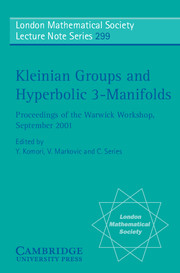 Kleinian Groups and Hyperbolic 3-Manifolds
Kleinian Groups and Hyperbolic 3-Manifolds from Part III - Related topics
Published online by Cambridge University Press: 10 September 2009
Abstract
Horowitz [Hor72] showed that for every n ≥ 2, there exist elements w1,…, wn in F2 = free(a, b) which generate non-conjugate maximal cyclic subgroups of F2 and which have the property that trace(ρ(w1)) =…= trace(ρ(wn)) for all faithful representations ρ of F2 into SL2(ℂ). Randol [Ran80] used this result to show that the length spectrum of a hyperbolic surface has unbounded multiplicity. Masters [Mat00] has recently extended this unboundness of the length spectrum to hyperbolic 3-manifolds. The purpose of this note is to present a survey of what is known about characters of faithful representations of F2 into SL2(ℂ), to give a conjectural topological characterization of such n-tuples of elements of F2, and to discuss the case of faithful representations of general surface groups and 3-manifold groups.
Introduction, history, and motivation
The purpose of this survey is to explore the following question, asked during the Special Session on Geometric Function Theory, held in Hartford, Connecticut, during the 898th meeting of the AMS in March, 1995 (for a list of all the questions asked during that session, we refer the reader to Basmajian [Bas97]):
15. According to a theorem of Horowitz (see Horowitz [Hor72], Randol [Ran80]), there exist pairs of closed curves on a closed [orientable] surface S [with negative Euler characteristic] for which the lengths of the geodesics in the respective homotopy classes are equal for any hyperbolic structure on S. These constructions all involve writing down a pair of words in the fundamental group for S and then applying trace identities to show that the words have the same trace, independent of the representation into PSL(2,ℝ). Find a topological characterization of sucha pair of curves.
To save this book to your Kindle, first ensure [email protected] is added to your Approved Personal Document E-mail List under your Personal Document Settings on the Manage Your Content and Devices page of your Amazon account. Then enter the ‘name’ part of your Kindle email address below. Find out more about saving to your Kindle.
Note you can select to save to either the @free.kindle.com or @kindle.com variations. ‘@free.kindle.com’ emails are free but can only be saved to your device when it is connected to wi-fi. ‘@kindle.com’ emails can be delivered even when you are not connected to wi-fi, but note that service fees apply.
Find out more about the Kindle Personal Document Service.
To save content items to your account, please confirm that you agree to abide by our usage policies. If this is the first time you use this feature, you will be asked to authorise Cambridge Core to connect with your account. Find out more about saving content to Dropbox.
To save content items to your account, please confirm that you agree to abide by our usage policies. If this is the first time you use this feature, you will be asked to authorise Cambridge Core to connect with your account. Find out more about saving content to Google Drive.